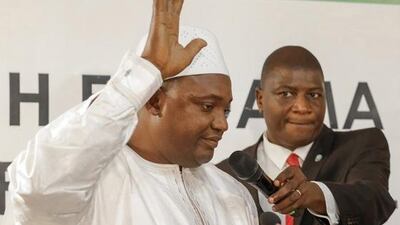As befitted a man who styled himself “Excellency Sheikh Professor Doctor President”, Gambia’s dictator Yahya Jammeh had a tendency to hyperbole when on the campaign trail. Not only did he boast that he would rule for a billion years if necessary, he claimed the only person who could stop his rule was the Almighty himself.
Last month, though, elections saw him lose to someone altogether humbler. Opposition candidate Adama Barrow, whose CV includes working as a high street store security guard in London, had no experience of office, zero political profile, and – in the eyes of many – zero chance of winning either. The 51-year-old Gambian then staged one of the year’s greatest David and Goliath acts, defeating one of Africa’s most feared strongmen fair and square.
Yet joy at Barrow’s victory spread well beyond the borders of just Gambia, a tiny nation of 1.9 million people who had suffered 22 years of dictatorship. For many in other countries who barely register the African migrants working for them as security guards, taxi drivers and mall attendants, it was a reminder that everyone has hidden depths. And for those dismayed at the coming of Donald Trump and Brexit, it was welcome proof that sometimes, at least, democracy still gets it right.
Barrow’s actual election win on December 1, though, was just episode one of the drama. First Jammeh graciously accepted defeat, then, in pantomime-villain fashion, decided to cling to power after all, claiming the election had been rigged. Amid fears that Jammeh might send hitmen to kill him, Barrow fled to neighbouring Senegal. As pressure on Jammeh to step down grew, the regional West African power bloc, the Economic Community of West African States, dispatched troops to the border, warning that he would be toppled by force if he didn’t go quietly.
For much of the week before last, Gambia teetered on the brink of war, only for Jammeh to quit at the 11th hour last Saturday, accepting an offer of asylum from fellow dictator Teodoro Obiang, of Equatorial Guinea. Barrow is now due for a heroic homecoming after being sworn in as president at a makeshift ceremony at the Gambian embassy in Senegal.
Barrow also won praise for his statesmanlike behaviour during the crisis, avoiding slanging matches with Jammeh. His first move, he says – after releasing all of Gambia's hundreds of political prisoners – will be reconnecting Gambia with the outside world. Its palm-lined tourist beaches attract 100,000 holidaymakers a year, yet under Jammeh's anti-western course, the former British colony withdrew from the International Criminal Court, pulled out of the Commonwealth and faced the constant threat of sanctions because of breaches of human rights by Jammeh's secret police. "The message is, the Gambia is back again," Barrow told The New York Times last week. "We have been isolated for so many years ... and we want to join all the international organisations."
Ironically, had Jammeh not been so fond of jailing people, Barrow might never have won in the first place. He was not supposed to be running for president at all, but was put in as a replacement after the main opposition candidate, Ousainou Darboe, was jailed for taking part in an anti-government demonstration. The crackdown was designed to minimise any chance of Jammeh losing the elections, but backfired by uniting the normally fractious opposition behind Barrow, who had much more appeal than the ageing Mr Darboe.
True, in person, he does not ooze charisma, speaking in quiet, unassuming tones. Then again, after two decades of Jammeh’s bombast, few Gambians are crying out for another bombastic loudmouth. Unusually, Barrow also speaks all four of Gambia’s main tongues, making him well placed to heal ethnic divides that Jammeh deliberately stirred.
His own life story also speaks for itself when it comes to inspiration. After leaving school and working as a gas sales manager, he spent part of his 20s and 30s doing what many upwardly mobile Gambians do, travelling to Europe to both work and study.
In London, he took a private course in property management, paying his rent by working as a security guard at music festivals, shops and offices. At a branch of the Argos budget chain store on London’s Holloway Road, he once tackled a troublemaker who was later jailed for six months, with Barrow as the key prosecution witness.
The work was far from glamorous, and since disclosing it in a pre-election interview, Barrow has gained the permanent tag of “former security guard turned president”.
Jammeh’s supporters even made fun of it during election campaign speeches. Yet Barrow claims it was also the making of him. “My time in Britain taught me the importance of working hard and good time-keeping,” he says. “Both those things helped me a lot when I went back home.”
A practising Muslim who is married with two wives and five children, Barrow will now be moving from his cramped agency offices in the Gambian capital, Banjul, to the rather grander presidential parlour in State House. But he now has his work cut out living up to expectations.
Barrow has no previous experience of holding office. Now he must reform Gambia’s underperforming economy and predatory security services, and try to reverse a brain-drain that has seen huge numbers of Gambians take people-smuggling boats to Europe.
Most used to argue that the risk was worth it, given their lack of job prospects under Jammeh. It will be up to Barrow to convince them that from now on, Gambians who want to get on in life do not have to work as security guards in London.
weekend@thenational.ae

